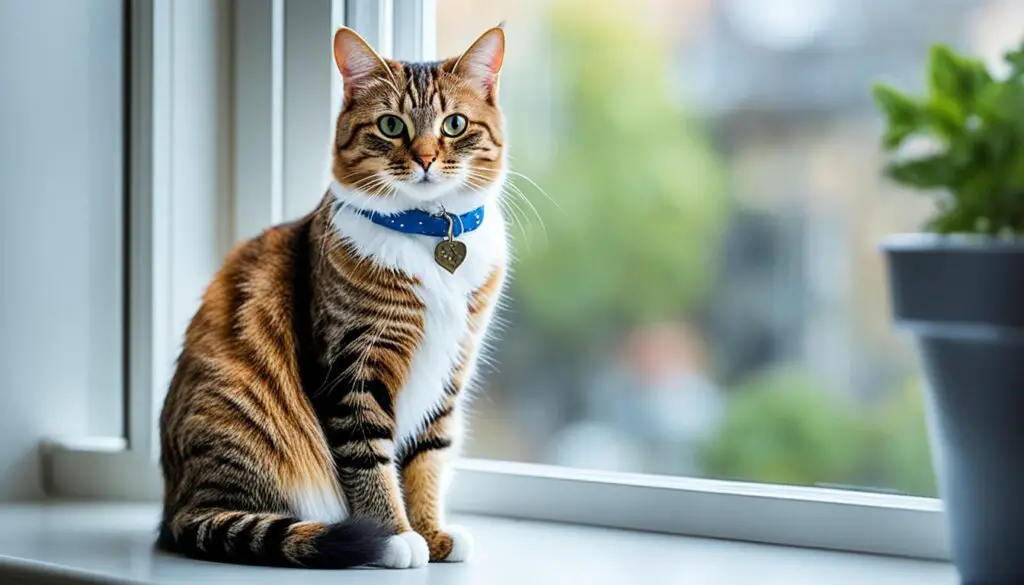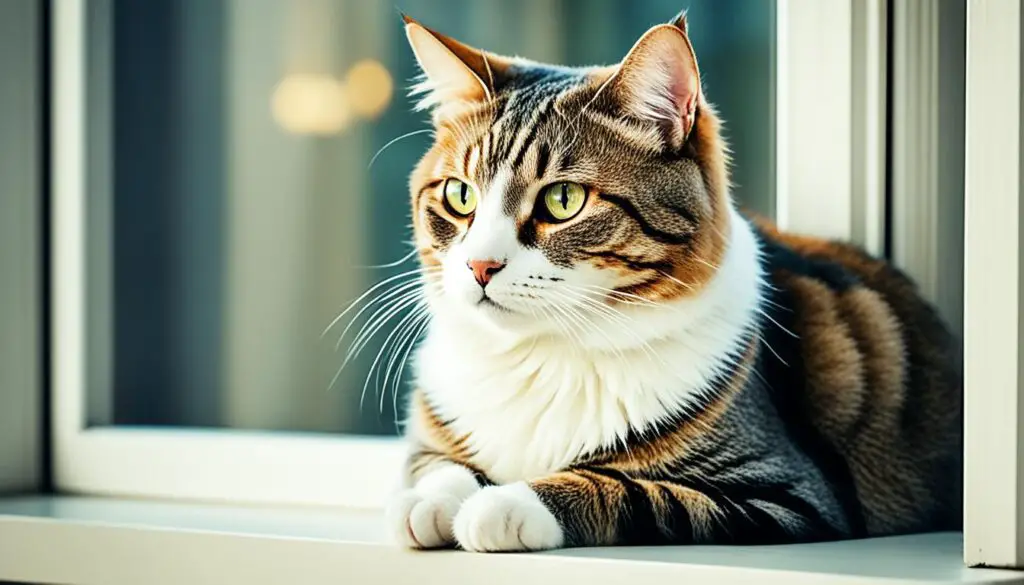I’ve often wondered if cats really remember and miss their old owners. It’s a question close to my heart as a cat lover. Does the bond between cats and their former humans stick, even if they part ways? And do cats feel the loss of those who once meant everything to them?
Cats can get very attached to their owners. This, paired with their smarts, hints they might remember past times. Today, we dive into the world of a cat’s emotions and memories.
Key Takeaways
- Cats have a strong associative memory, allowing them to recall people, places, and experiences from their past.
- When rehomed or brought to a shelter, cats may exhibit signs of separation anxiety or grieving for their previous owners, especially if they shared a close bond.
- The strength and duration of a cat’s attachment to former owners can depend on factors like the cat’s age, personality, and how they were treated by the previous caregiver.
- Cats can recognize their owners’ voices and scents, even after extended periods of separation, and may exhibit positive behaviors when reunited.
- While cats live in the moment, they can form lasting memories and emotional connections with their past owners, which can impact their behavior and well-being.
Introduction to Feline Memory and Attachment
Cats have a great memory. They remember past events, people, and places very well. This memory is key to their strong bond with humans. Cats can remember their owners’ faces and voices for a long time, even when separated for months or years.
Understanding Cat-Human Bond
The bond between a cat and its human is deep and complex. Cats attach emotionally to their owners. They show this by wanting to be near them, making sounds, and feeling anxious when they’re not together. This bond is shaped by the cat’s age and personality, and how they were treated before.
Exploring Cat Cognition and Emotions
Cats have deep emotions and smart minds. They can feel affection, attachment, and sadness when away from loved ones. Cats are also great at learning, solving problems, and remembering. This shows they have far-reaching mental abilities.

“Cats have a remarkable memory capacity, allowing them to recall people, places, and experiences from their past.”
Understanding how cats remember and bond is important. It helps us see the true intelligence and feelings of cats. By knowing this, we can better care for our feline friends. We can enrich the already strong connection between cats and their owners.
Do Cats Remember Their Past Owners?
Cats are known for being independent. But they remember those who cared for them. This shows their strong memory.
Associative Memory and Recognition
Cats don’t remember past owners as unique people. They remember the love and experiences shared with them. If they see a past caregiver, they may show they remember through their actions.
Research shows cats have great long-term memory. They remember their owners for months or years. This memory ability is higher than many other animals.
Cats remember using what they see, hear, and smell. They recognize their owner’s voice and the scents of their beloved ones.
“Cats remember their past owners well, even after a long absence. This is thanks to their deep memory of the care and experiences shared with them.”
The bond with their owner affects how long cats remember them. Those well-cared for remember their owners longer. This includes those brought to shelters or new homes.

Cats may not show traditional affection like other pets. Yet, their memory of past owners proves their emotional depth.
Feline Separation Anxiety and Pet Loss Grieving
After being separated from their old owners, cats can get really upset. They might not eat as much, talk more, or change when they sleep. These things show they miss their old home. This can help new owners understand and support their cat during this tough time.
There’s a 2006 study in Animal Cognition. It shows cats forget where they saw something hidden pretty quickly. If they keep looking at it, they can remember for over a day. This means practicing something gets it stuck in their minds better.
Cats can remember people for a long time, especially if they were close. They know faces and sounds even after years apart. How strong the bond was and how they were treated before affects how sad they become.
The ASPCA did a study called the Companion Animal Mourning Project. It found over half of cats act sad when a friend cat or human dies. They might eat less, sleep different, talk more, or act stressed. This sadness usually goes away after a few months, with most getting over it by six months later.
If your cat is very sad after losing someone, talking to the vet might help. They could give advice or medicine to make things easier for your cat.
“Many cats slept more than usual while some suffered insomnia. Some cats changed the area of the house where they slept.”
Do cats ever remember their past owners and miss them?
Signs of Missing Former Owners
Cats do remember at times and miss their old owners, even if they were taken to a new home or a shelter. You might notice these cats being more vocal, not eating as much, sleeping differently, or wanting more attention. If a cat feels disconnected from its new surroundings, it could be a sign.
Studies show cats have strong memories, remembering people for up to 10 years. They can remember things for a long time. This is unique because their short-term memory can last for about 16 hours, unlike other animals, which is just 25 seconds.
Cats link scents, sounds, and experiences with their owners, forming deep bonds. When these bonds are broken, the cat might show signs of sadness, like meowing a lot or not eating. They might look for items that remind them of their old owner. This proves that they remember and miss their past owners.
“Cats have a better long-term memory and can remember persons or events for months or even years.”
Usually, the time a cat misses an old owner is brief. They start to settle in with their new life and the new person who takes care of them. It’s important for new owners to be aware of these signs of missing former owners. This understanding helps them provide needed support to their furry friends during this tough time.
Factors Influencing Cat-Human Bond Strength
The strength and time a cat bonds with old owners is shaped by its age, character, and past care. Knowing this helps new owners understand their cat better. It explains the cat’s feelings and actions in a new home.
Age and Personality of the Cat
Younger cats, along with friendly and outgoing ones, quickly make strong connections. They like human touch more. This helps them bond deeply with their owners, even new ones. But older or shy cats might not form bonds as easily. They might find change hard, especially if they’ve moved around a lot.
Treatment by Previous Owner
Cats that got love and care from their old owners remember this. They may feel sad when away or want the same love from new owners. On the other hand, a cat that wasn’t treated well might not trust people much. They might be slow to open up to a new owner.
“Understanding the factors that influence a cat’s bond with their previous owner can help new caregivers provide a smooth transition and foster a strong relationship with their feline companion.”
Adjusting to New Owners and Environments
Cats often find it hard to change their routines and get used to new owners. They might miss their old people, but they have the superpower to love others quickly.
This process takes time, though. New owners need to be patient and loving. They should stick to a schedule and show their cats they care. This way, the cats will learn to feel safe and loved in their new home.
Bonding with New Caregivers
Making the change easy for your cat involves creating a loving space and spending time together. The cat’s age, how it acts, and what it’s been through affect how fast it adapts.
It’s important for new cat parents to listen to what their cat likes and needs. This helps in making a strong friendship. Understanding your cat helps the whole family bond better.
Using things like pheromone diffusers and calming music can reduce your cat’s stress. A regular meal time and doing the same things every day build their trust in the new place. Watching how they act and move tells you if they’re happy and how to make friends with them.
Some cats might settle in fast, while others will take longer. It’s all about being patient and kind during this time. Regular check-ups at the vet make sure your cat is healthy and happy in their new home.
“Cats are creatures of habit, and adjusting to new owners and environments can be a delicate process. With patience, affection, and a consistent routine, cats can learn to trust and connect with their new families.”
Long-term Memory in Cats
Cats have a surprising long-term memory. It lets them remember people, places, and times from their past, even for years. This memory can make them miss previous owners if they are moved to new places.
Experts say that cats remember things for much longer than they forget them. They can recall someone they met for up to 10 years. This is longer than most animals and even dogs. Compared to dogs, cats remember faces 200 times better.
Cats have memories connected to certain experiences, both good and bad. They can remember a face for up to a decade. They keep feelings from past times with people stored away, whether good or bad.
When a cat acts differently after being away from their owner, it’s likely because of anxiety. They tend to remember things that serve them well. This is unlike dogs who remember their people better, maybe because they’ve lived with humans longer.
As cats get older, they might have issues with their memory. This can happen when they’re 11-20 years old. Feeding them the right foods can help keep their brains sharp.
Impact of Past Experiences on Cat Behavior
A cat’s past, either good or bad, shapes how they act with new owners and places. It’s key to know this to give them proper care.
Positive Associations
Cats that were loved and cared for before might act like they remember their old family. They might meow more, want more petting, and feel sad when they’re alone.
Negative Associations
But, if they were neglected or harmed, they might not trust easily. They could hide, get angry, or have trouble being close to new owners. It’s a way for them to keep safe after bad experiences.
Creating a stable, loving home and letting the cat come to you can help. It’s all about being patient and kind, especially with cats that have had a hard time before.
“Cats may run around wildly when they’re bored or upset, or they see another cat they don’t like.”
Cats’ personalities also depend on their age, breed, and past treatment. Knowing this, new owners can deal better with any issues their cat might have.
Conclusion
The evidence is clear: cats remember their past owners. They can feel a sense of loss when separated. This is because they have a strong memory for people and places they’ve known.
Cats often remember the care and love from those who looked after them before. The memory and the feelings they had can stay with them for a long time. This is why they might miss their old owners, even after moving to a new home.
Understanding a cat’s memory and its bond with humans is important. This understanding can help new owners support their cats better. It can make the journey to a new home easier on them.
How long a cat lived with its old owner, the care it received, and its own traits all matter. They affect how strong the cat’s memory and bond might be. They also influence how well the cat can adjust to new places.
Finally, the invisible tie between cats and their owners shows us something special. It shines light on the impressive memory and deep emotions of these friends. Research into cat memory and behavior can help us understand and cherish this connection even more.
FAQ
Do cats ever remember their past owners and miss them?
Cats can remember their former owners based on personal stories. Even after bonding with a new caretaker, they might miss the old one. Their strong associative memory helps them remember people and places from the past.
How do cats exhibit signs of remembering and missing their former owners?
When they are rehomed, cats show signs if they miss their old owners. They might have separation anxiety or grieve for their past close relationships. Signs include more meowing, not eating as much, and sleeping differently.
What factors influence a cat’s attachment and memory of their past owners?
Many factors influence the bond cats have with their old owners. Age, personality, and previous treatment matter a lot. Younger and more social cats often form deep attachments that last.
Can cats form new bonds with new owners after being rehomed?
Cats can indeed make new relationships and adapt to new homes. It all takes time, love, and a set schedule. With these, cats learn to trust and love their new families, even if they’ve been rehomed before.
How does a cat’s long-term memory impact their recognition of past owners?
Cats have outstanding long-term memories for people and places. They can remember their old owners even after months or years. This helps them potentially miss those from their past, even after moving to a new place.
How can a cat’s past experiences influence their behavior with new owners?
Past experiences shape how cats act with new owners. Well-cared-for cats with strong past bonds may show signs of remembering their old owner. Cats who were mistreated might find it harder to trust new people or to form new bonds.

Comments